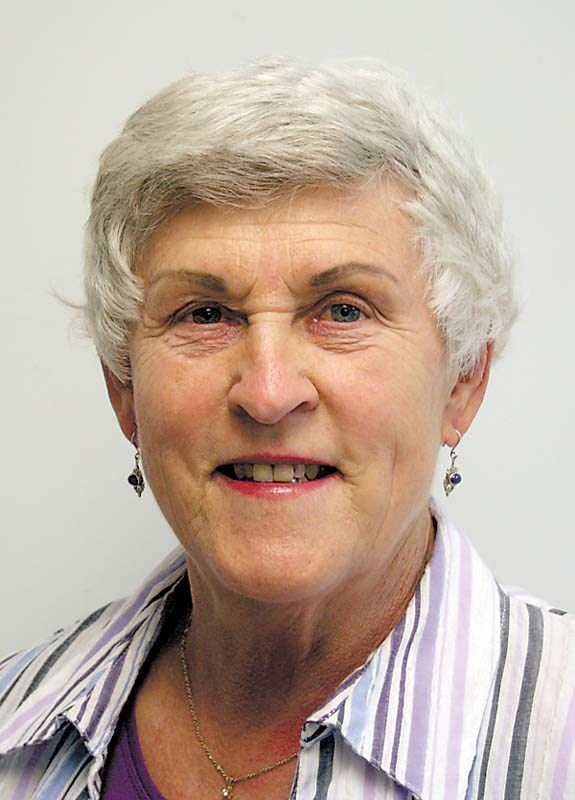The cat, Corinne Jeffery says, is finally out of the proverbial bag.
The cat, Corinne Jeffery says, is finally out of the proverbial bag. “This is a work of fiction, based on real events,” it says right there on page viii of Choosing: 1940 – 1989, the final book in the sleeper hit series called Understanding Ursula. The first two books were right out of the author's imagination, but now we know the truth. Her truth.
The fictional Werners, as it turns out, are really her own family, with a bit of artistic license. All of the names are different, for one thing.
“I do tell people that every honest author writes about what they know,” she began slyly, backtracking only ever so slightly to reinforce how the first two books – Arriving and Thriving – really were more fiction than factual. “I did make up some of the occurrences because there's day to day life. The people are my family.”
Choosing, on the other hand, comes across loud and clear as autobiographical. Jeffery made the deliberate choice to write from the heart and hopes that her fans will remain loyal. She knew that she wasn't fooling everyone, after all.
“I have mixed, ambivalent feelings about that. There is some anxiety. There is some relief. Readers have figured it out. Over and over again, people are coming up to me and saying, ‘I know exactly what you did, Corinne. All you did was change the names and write your story.' I've even had distant relatives track me down… so I don't think I have surprised a lot of people.”
The book is now in its final days before being released and Jeffery is enjoying the calm before the storm hits. After the book comes out, she'll be back on the road, taking Ursula on a town-to-town tour.
The extended storyline started in 1909 and carried readers through the saga of the Werners, an immigrant family of German Lutheran pacifists as they settled on a Saskatchewan farm, learning to survive and – yes – thrive with nary a dull moment to spare. This isn't some idyllic family history like Little House on the Prairie, not by a longshot. There is personal turmoil and some great emotional struggles over five generations of the stalwart clan.
“I've had such a tumultuous family history. My trilogy is a labour of love for my grandparents. Sure, I've embellished the story because life can sometimes be fairly mundane unless you add a few things to it,” she laughed. “That's why we're blessed with an imagination.”
Jeffery's flair for writing helps a lot too. Two years ago, readers might not have expected to jump at the chance to read more about a farming family from a hundred years ago, but they have. The public has wholly embraced these stories and their characters in large part because of how the author portrays everything so realistically. We read how characters speak and we can hear just how they talk. We learn about some of the brutalities of their experiences and we somehow relate. It's not just that we all have to survive the same northern climate. It's more like we all have to survive and overcome the adversities in our own lives, and to bear witness to how the Werners accomplish this is personally enriching and life affirming. Jeffery's talent isn't just with her gift to string sentences together and give flesh to her characters. It's her openness that allows us all to enter her world.
The fact that she also makes fine use of shorter chapters (and a very handy family tree at the opening of Choosing to help keep track of all of the different names) gives even the novice reader an equal opportunity to join in. It also bears well for repeated readings but the story rides like a rollercoaster at times: a little too fast for comfort and there's a lot more going on under the surface than you would first expect.
“It is very revealing. The third book… all the secrets are revealed on a personal level. As I was writing the third book, I knew what I was writing and it was still very tumultuous. It's even more tumultuous! The language and everything changes in this book.”
There's another secret that gets revealed but only in Jeffery's back story, not in the Ursula storyline.
“I never intended to do anything with this trilogy. I was just writing it!” the former nurse and educator confessed. “My daughter kept tracking me, she'd be reading excerpts and she'd say, ‘Mom, what are you going to do with this?' I'd say, ‘Nothing! This is my healing journey!”
To help promote her new book, Jeffery has a special book launch lined up just in time for Alberta Culture Days. It takes place from 2 to 4 p.m. on Sunday, September 29 at the St. Albert Public Library. People are encouraged to register for this free event by calling 780-459-1682 or by visiting the second floor information desk. Copies of all three books will be available for purchase on site.
Jeffery is also at the Farmers' Market from 10 a.m. to 3 p.m. today.
Readers can learn more about the author, her works and appearances at www.corinnejeffery.ca or www.understandingursula.com.
Please register for this free event by calling 780-459-1682 or at the Information Desk on the 2nd floor of the library.
After that, Jeffery will tour her book around the province, returning to this city on Friday, October 25. She will host a book signing at Chapters from noon to 6 p.m. The store is located at #30, 445 St Albert Trail.
Details
Choosing: 1940 — 1989<br />The final novel in the Understanding Ursula trilogy<br />by Corinne Jeffery<br />354 pages<br />$24.99<br />Roadie Books
